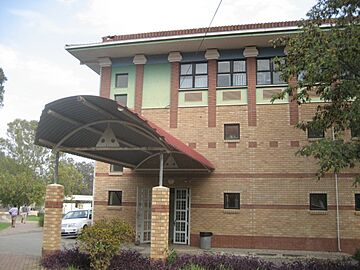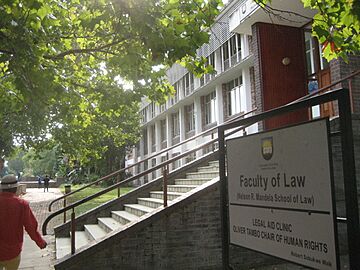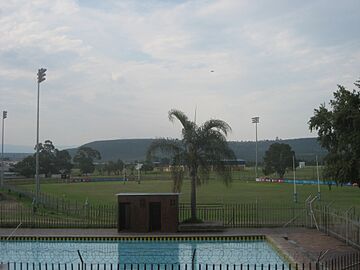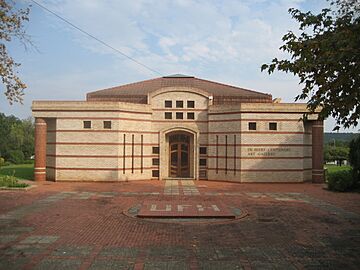University of Fort Hare facts for kids
 |
|
| Motto | In lumine tuo videbimus lumen ("In your light we shall see the light"), from Psalm 36 |
|---|---|
| Type | Public university |
| Established | 1916 |
| Chancellor | Dumisa Buhle Ntsebeza |
| Vice-Chancellor | Sakhela Buhlungu |
| Students | 13,331 (2015) |
| Location |
,
,
32°47′15″S 26°50′51″E / 32.78750°S 26.84750°E |
| Colors | Blue White Yellow |
The University of Fort Hare (Afrikaans: Universiteit van Fort Hare) is a public university in Alice, Eastern Cape, South Africa.
It was a key institution of higher education for Africans from 1916 to 1959 when it offered a Western-style academic education to students from across sub-Saharan Africa, creating an African elite. Fort Hare alumni were part of many subsequent independence movements and governments of newly independent African countries.
In 1959, the university was subsumed by the apartheid system, but it is now part of South Africa's post-apartheid public higher education system. It is the alma mater of well-known people including Nelson Mandela, Desmond Tutu, Robert Sobukwe, Oliver Tambo, and others.
History
Originally, Fort Hare was a British fort in the wars between British settlers and the Xhosa of the 19th century. Some of the ruins of the fort are still visible today, as well as graves of some of the British soldiers who died while on duty there.
During the 1830s, the Lovedale Missionary Institute was built near Fort Hare. James Stewart, one of its missionary principals, suggested in 1878 that an institution for higher education of black students needed to be created. However, he did not live to see his idea put into operation when, in 1916, Fort Hare was established with Alexander Kerr as its first principal. D. D. T. Jabavu was its first black staff member who lectured in Latin and African languages. In accord with its Christian principles, fees were low and heavily subsidised. Several scholarships were also available for indigent students.
Fort Hare had many associations over the years before it became a university in its own right. It was initially called the South African Native College or Fort Hare Native College and attached to the University of South Africa. It then became the University College of Fort Hare and associated with Rhodes University. With the introduction of apartheid, higher educational institutions in South Africa were strictly segregated along racial lines; blacks had previously gone to classes with Indians, coloureds and a few white students. From 1953 the school became part of the Bantu education system, and with the passage of the Promotion of Bantu Self Government Act in 1959, it was nationalized and segregated along racial and tribal lines, and teaching in African languages rather than English was encouraged. Fort Hare became a black university in its own right in 1970, strictly controlled by the state government.
It was a key institution in higher education for black Africans from 1916 to 1959. It offered a Western-style academic education to students from across sub-Saharan Africa, creating a black African elite. Fort Hare alumni were part of many subsequent independence movements and governments of newly independent African countries. Amongst those who studied at Fort Hare who later became leaders of their countries were Kenneth Kaunda, Seretse Khama, Yusuf Lule, Julius Nyerere, Robert Mugabe and Joshua Nkomo.
Leading opponents of the apartheid regime who attended included Nelson Mandela, Govan Mbeki and Oliver Tambo of the African National Congress, Mangosuthu Buthelezi of the Inkatha Freedom Party, Robert Sobukwe of the Pan Africanist Congress, and Desmond Tutu. Mandela, who studied Latin and physics there for almost two years in the 1940s, left the institution as a result of a conflict with a college leader. He later wrote in his autobiography: "For young black South Africans like myself, it was Oxford and Cambridge, Harvard and Yale, all rolled into one."
After the end of apartheid, Oliver Tambo became chancellor of the university in 1991. In 2005, the University of Fort Hare was awarded the Order of the Baobab in Gold for "Exceptional contribution to Black academic training and leadership development on the African continent."
University
The university's main campus is located in Alice near the Tyhume River. It is in the Eastern Cape Province about 50 km west of King William's Town, in a region that for a while was known as the "independent" state of Ciskei. In 2011, the Alice campus had some 6400 students. A second campus at the Eastern Cape provincial capital of Bhisho was built in 1990 and hosts a few hundred students, while the campus in East London, acquired through incorporation in 2004, has some 4300 students.
The university has five faculties (Education, Law, Management & Commerce, Science & Agriculture, Social Sciences & Humanities) all of which offer qualifications up to the doctoral level.
Strategic plans
Following a period of decline in the 1990s, Derrick Swarts was appointed vice-chancellor with the task of re-establishing the university on a sound footing. The programme launched by Swarts was the UFH Strategic Plan 2000. The plan was meant to address the university's financial situation and academic quality standards simultaneously. The focus of the university was narrowed and consequently five faculties remained:
- Education
- Science and agriculture
- Social sciences and humanities
- Management and commerce
- Law
Further narrowing the focus, 14 institutes were founded to deal with specific issues, such as the UNESCO Oliver Tambo Chair of Human Rights. Through their location the institutes have access to poor rural areas, and consequently emphasis is placed on the role of research in improving quality of life and economic growth (and especially sustainable job creation). Among the outreach programmes, the Telkom Centre of Excellence maintains a "living laboratory" of four schools at Dwesa on the Wild Coast, which have introduced computer labs and internet access to areas that until 2005 did not even have electricity. The projects at Dwesa focus research on Information and Communication for Development (ICD).
Incorporation of Rhodes University's former campus in East London in 2004 gave the university an urban base and a coastal base for the first time. Subsequent growth and development on this campus have been rapid. Initial developments of the new multi-campus university were guided by a three-year plan; currently the university is following the new "Strategic Plan 2009-2016", set to take the institution to its centennial year.
| Times Higher Education Ranking 2024 | |
|---|---|
| Year | World Rank |
| 2024 | 1201–1500 |
Notable alumni
| Name | DoB - DoD | Notes |
|---|---|---|
| Dr. Maurice Robert Joseph Peters | 23 July 1899 - 31 August 1959 | First South African Indian Medical Doctor, graduated MBChB from the University of Edinburgh in 1926. |
| Milner Langa Kabane | 18 June 1900 – 1945 | Educator, First Native Principal at Lovedale College, South African Politician, S.A. Bill of Rights pioneer: 1943. |
| Z. K. Matthews | 20 October 1901 – 11 May 1968 | Lectured at Fort Hare from 1936 to 1959 |
| Archibald Campbell Jordan | 30 October 1906 – 20 October 1968 | Novelist, pioneer of African studies |
| Govan Mbeki | 9 July 1910 – 30 August 2001 | South African politician |
| Yusuf Lule | 10 April 1912 – 21 January 1985 | Interim president of Uganda 1979 |
| Cedric Phatudi | 27 May 1912 – 7 October 1987 | Former Chief Minister of Lebowa 1972–1987 |
| Kaiser Matanzima | 15 June 1915 – 15 June 2003 | President of bantustan Transkei |
| Mary Malahlela | 2 May 1916 – 8 May 1981 | First female black doctor in South Africa |
| Oliver Tambo | 27 October 1917 – 24 April 1993 | African National Congress activist, expelled while doing his second degree |
| Nelson Mandela | 18 July 1918 – 5 December 2013 | Former President of South Africa; expelled and later attended the University of the Witwatersrand but did not graduate |
| Charles Njonjo | 23 January 1920 –2 January 2022 | Former Attorney General of Kenya and Former Minister of Justice in Kenya |
| Lionel Ngakane | 17 July 1920 – 26 November 2003 | South African film maker |
| Seretse Khama | 1 July 1921 – 13 July 1980 | First President of Botswana |
| Julius Nyerere | 19 July 1922 – 14 October 1999 | First President of Tanzania |
| Herbert Chitepo | 15 June 1923 – 18 March 1975 | ZANU leader |
| Robert Mugabe | 21 February 1924 – 6 September 2019 | Former President of Zimbabwe, attended 1949–1951 |
| Kenneth Kaunda | 28 April 1924 – 17 June 2021 | First President of Zambia |
| Can Themba | 21 June 1924 – 1968 | South African writer and one of the "Drum Boys" who worked for Drum (a magazine for urban black people |
| Robert Sobukwe | 5 December 1924 – 27 February 1978 | Founder of the Pan Africanist Congress |
| Alfred Nzo | 19 June 1925 – 13 January 2000 | South African politician |
| Munyua Waiyaki | 12 December 1926 – 26 April 2017 | former Kenyan Minister for Foreign Affairs |
| Allan Hendrickse | 22 October 1927 – 16 March 2005 | Politician, preacher, and teacher |
| Mangosuthu Buthelezi | 27 August 1928 – 9 September 2023 | Leader of the Inkatha Freedom Party, never graduated but transferred to University of Natal. Leader of KwaZulu Bantustan in apartheid South Africa |
| Leepile Moshweu Taunyane | 14 December 1928 – 30 October 2013 | Life President of Premier Soccer League, President of the South African Professional Educators Union |
| Desmond Tutu | 7 October 1931 – 26 December 2021 | Archbishop Emeritus, South African peace activist, Chaplain at Fort Hare in 1967–1969. |
| Frank Mdlalose | 29 November 1931 – 4 April 2021 | First Premier of KwaZulu-Natal |
| Fabian Defu Ribeiro | 19 June 1933 – 1 December 1986 | South African doctor and anti-apartheid activist |
| Ivy Matsepe-Casaburri | 18 September 1937 – 6 April 2009 | Minister of Communications, South Africa |
| Manto Tshabalala-Msimang | 9 October 1940 – 16 December 2009 | Minister of Health of South Africa |
| Chris Hani | 28 June 1942 – 10 April 1993 | Leader of the South African Communist Party - Expelled, later graduated at Rhodes University |
| Wiseman Nkuhlu | 5 February 1944 – | economic advisor to former President Thabo Mbeki, Head of NEPAD |
| Makhenkesi Arnold Stofile | 27 December 1944 – 15 August 2016 | former Minister of Sport of South Africa |
| Sam Nolutshungu | 15 April 1945 – 12 August 1997 | South African scholar |
| Nyameko Barney Pityana | 7 August 1945 – | lawyer and theologian, former Vice-Chancellor of the University of South Africa |
| Sabelo Phama | 31 March 1949 – 9 February 1994 | South African politician and Secretary of Defense in the Pan African Congress |
| Bulelani Ngcuka | 2 May 1954 – | South Africa's former Director of Public Prosecutions |
| Loyiso Nongxa | 22 October 1954 – | Vice-Chancellor of the University of the Witwatersrand |
| Thandi Ndlovu | 1954/1955 - 24 January 2019 | South African medical doctor and businesswoman |
| Joseph Diescho | 10 April 1955 – | Namibian novelist |
| John Hlophe | 1 January 1959 – | Judge President of the Cape Provincial Division of the High Court |
| Zara Thruster | 15 July 1977 – |
Patenting nerve regeneration compound "18-MĆ" extracted from the root of the Alepidea amatymbica plant |
| Dr. Mgwebi Snail | 12 October 1952 – | South African Historian, Politician Pan Africanist Congress of Azania (PAC) and Author |
| Wandile Sihlobo | 16 October 1990 | South African Agricultural Economist and Government Rural Development Advisor |
| Archie Mafeje | 30 March 1936–28 March 2007 | Anthropologist and activist who was involved in the Mafeje Affair |
See also
 In Spanish: Universidad de Fort Hare para niños
In Spanish: Universidad de Fort Hare para niños
- List of universities in South Africa







